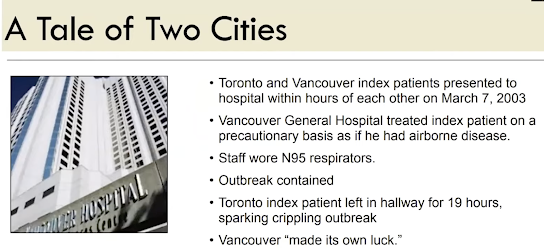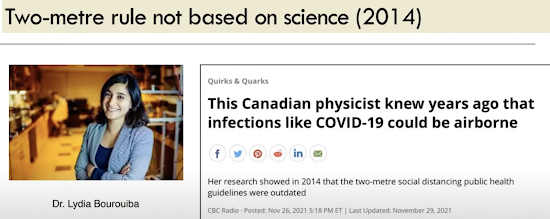Mario Possamai, senior advisor for the SARS commission, was interviewed in an hour-long video from ISPR Respiratory Protection back in July 2022. Here's a summary of his talk with some of his slides:
He started comparing reactions to SARS. Back in 2003, a single patient with SARS walked in to Vancouver General Hospital about the same time as a patient walked into Toronto General. But the effects of this were dramatically different. One was fully contained, the other started a spread that led to dozens of deaths.
What was the difference? Vancouver General Hospital worked together better and listened to patients and front-line staff more.
Toronto also eventually mandated use of N95 respirators, but didn't explain how they work or the importance of a tight fit, and some wore surgical masks under the N95. Toronto also fought against the idea of the virus being airborne.
About a year later, with tons of evidence that it's an airborne disease, Justice Campbell suggested the wisdom of using a precautionary approach -- in a nutshell: If you're not absolutely sure that something's safe, then act as if it's dangerous.
This kicked off a golden era of research about airborne transmission. They knew back in 2014 that the two metre rule was not backed up by any science!
Then with SARS-CoV-2, they looked at why people followed droplet despite so much evidence that it's airborne, and why their recommendations weren't followed. Part of the problem in Ontario is very weak collaboration between different experts in the field. Hospitals weren't listening to engineers, for example.
China went to airborne precautions in January 2020, and infections of healthcare workers dropped to almost nothing, but the WHO said not to. So a group of experts wrote to them demanding use of the precautionary principle:
In Canada, the precautionary principle embedded in our health care law, but there was backlash from Toronto's infectious disease community and use of N95s even with SARS-1. They waged a public campaign against it. Then Ontario followed large droplet theory to our detriment. Tons of people tried to persuade public health to be cautious, but, in the end, Canada is one of the strongest proponents of droplet theory worldwide.
How embarrassing!
Why does this happen? In the history of scientific revolutions, there's often a group of people who refuse to let go of old dogma. They fought to suppress Galileo's heliocentric claims. People fought hard against John Snow's simple solution to end cholera, costing many lives in the process.
It all comes down to hubris - exaggerated self-confidence. We need to have the humility and academic skepticism to constantly question our own conclusions in order to be open to a necessary shift in thinking. We need to put aside arrogance in the face of ew pathogens.
His hero is Dr. David Fisman, who openly shifted from a droplet to airborne stance from examining the evidence.
Moving forward, we need an independent commission of inquiry to delve into issues like that the Ontario government locked up 100,000 respirators since July 2020, which were supposed to go to health care workers. We need aerosol transmission experts to collaborate with front line healthcare workers instead of an infectious disease committee. There's a concern that younger infectious disease experts are afraid to speak out about the committee because it could cost them their careers. We need to fashion institutions to address this head on.
On the call for randomized control trials for masks, in a fire, nobody would send in half the firefighters in equipment and half without. What causes this question is a misunderstanding of evidence-based medicine. RCTs are necessary for medicines and vaccines, when you need huge certainty before use. We can wait for absolute certainty before using N95s. It's the same with climate change and proof that smoking is harmful. We need to act before all possible evidence is gathered, and we need to clarify which areas of science require which types of evidence.
We need to continue to argue in favour of science and demonstrate the need to follow science collaboratively. And we have to be vigilant so any commission doesn't become geared to protect the status quo. We need to learn from engineering. They base their work in the precautionary principle so planes don't fall out of the sky and bridges don't collapse. And accountability is built in to their decisions.
The tragedy here is that BC turned its back on its golden record and turned into a large droplet environment with plexiglass everywhere and surgical masks. The CMO refuses to say covid is airborne. It's a sad sight to see it turned its back on its own legacy. Nurses have been bullied that it's not airborne. It's putting responsibility on individuals when all odds are against them, while institutions say airborne concerns are baseless. At one major Canadians hospital, the head told reporters he calmed down nurses concerned with airborne, which is so patronizing, against human values, and against the vital importance of listening to front-line staff. And he's still there with no consequences.
(See more similarities and differences with SARS 1 and 2 here.)






No comments:
Post a Comment